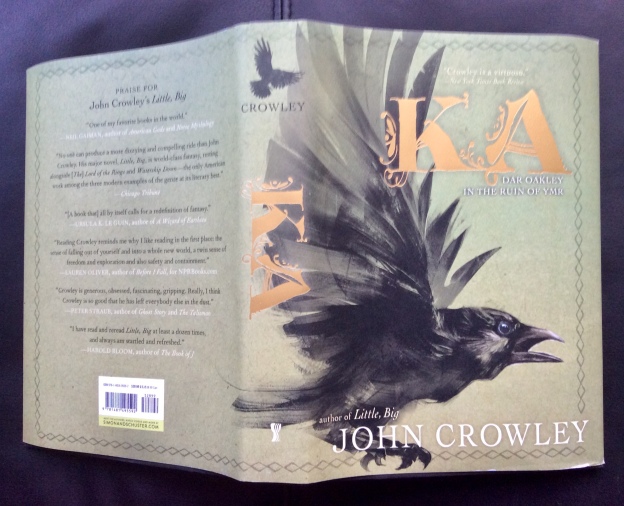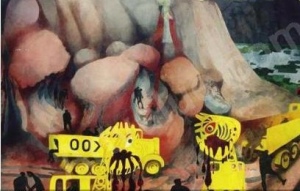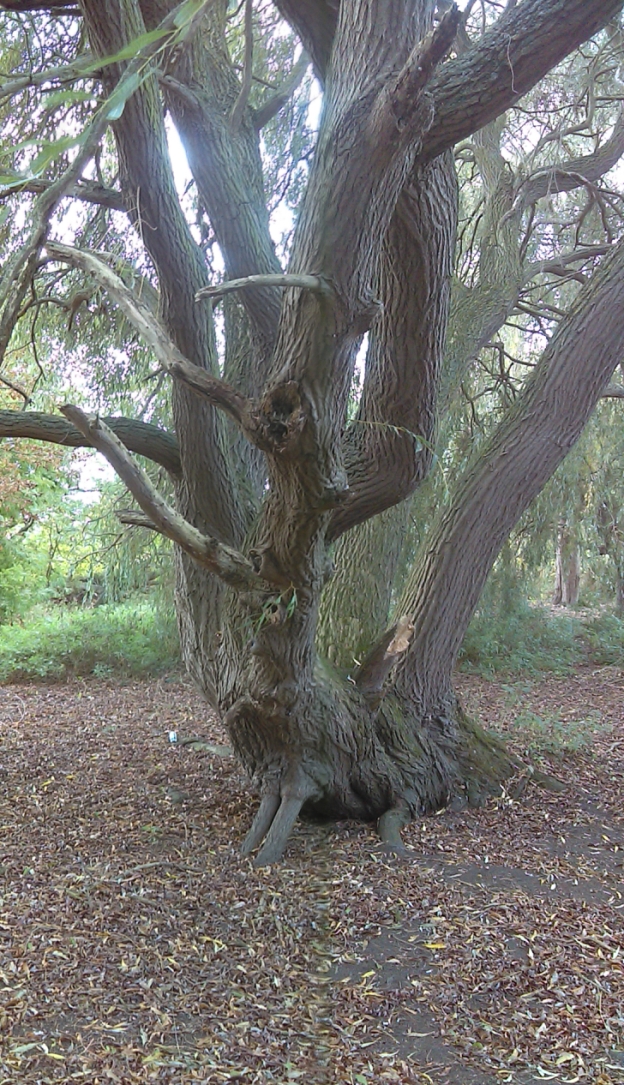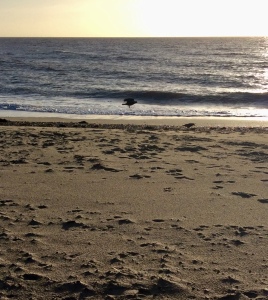KA: Dar Oakley in the Ruin of Ymr – John Crowley

SAGA PRESS 2017
When I real-time review this novel, my thoughts will appear in the comment stream below…

www.nemonymous.com
Des Lewis - GESTALT REAL-TIME BOOK REVIEWS
A FEARLESS FAITH IN FICTION — THE PASSION OF THE READING MOMENT CRYSTALLISED — Empirical literary critiques from 2008 as based on purchased books.



 Chapter Two
Chapter Two And now with the Internet, nearer still?
And now with the Internet, nearer still?
THE BANKER OF INGOLSTADT
“I remember attempting to galvanise a dead horse when all my friends wanted to do was arrange flowers or tie ribbons in their hair–”
A rolling conceit-to-conceit classic of this author, with a probably unique style for the year 2000 when it was published, and only this author has maintained such a supreme level of fictionatronic absurdity since then. My theory is that this author’s work is a living banker, a slightly flawed gestalt experiment still in 2017 on-going, one-off, but the flaws make it perfect, and not at all so that one can unscrew the works to see how they work. The tale of the would-be student (of colour and female gender) and the would-be racist and misogynistic banker of her grant has possibly become its own Mary Shelley’s Frankenstein’s monster. Frankenstein was Mary Shelley’s monster, the actual monster being Frankenstein’s. This book of telescopes is the author’s own monster towards hopeful fiscal self-reliance – and telescopes, if not necessarily their smell, are central to another Shelley, Percy Bysshe’s PROMETHEUS UNBOUND, a major work that for me puts a new meaning on this book, for the second decade of the 21st century. Next decade, there will be yet another meaning to uncover, I’ll be bound.
“My rooms are very secluded. They have never known a female presence. Even the fleas are exclusively male.”
A Rhys Hughes Welsh pub talk story, where a stranger tells locals, including the incognito village poet, that he is the egoectomist of poets. Collects their egos in bottles. If these bottles drunk then the poet’s ego mutantly affects the drinker by thinking they are a poet. To cut a short story short the last two sentences seem to indicate that this poet-fiction troubadour himself called Rhys Hughes, given time, may yet attain the status of creative genius. I reckon he already is, but you are not a creative genius until a quorum of the public believe so, too. And thus I now write stories, too, sometimes with horror trappings galore and other wormy tropes. Or was that something I used to do, before I met the egoectomist. Or the cannibal under the bridge, Billy goat gruff notwithstanding.
Contracted to two circles underneath
Their long, fine lashes; dark, far, measureless,
Orb within orb, and line through line inwoven.
— Shelley (Prometheus Unbound)
“The Italian republics did not like former pirates settling in their towns.”
I say this a lot. One day it will be true. This is the story that moves into Rhysian overdrive that overdrives beyond my mind’s previous measure. An overdrive of simile and conceit and utter meaningful madness of meaninglessness, where an ex-pirate called ‘Ceti opens a barber-shop in an Italian town. No way I can do justice to it here. It sort of flows, leaving a story to simmer in a sump it has made for itself in your brain.
“But, unfortunately, this is the real world; life is a sour cream poured on stones.”
A told amoral fable where those told it join in with quick fire changes of their trousers and souls. I am beginning to think some of these stories in this TELESCOPES book are seen via orb on Shelley’s orb or through the wrong end or genuinely iconic. I seriously suspect, over time, since 2000, that they are becoming iconic like the stories of Grimm or Hans Anderson. Given a quorum of readers.
“Instead of placing the glass to his lips, he held it under his cheek and lowered his prolapsed orbit into the murky depths.”
Making the eye smell of real ale. At first, from the title, I thought this would be a skit on Poe, but instead it’s a Monty Python type journey into Shropshire with the names of beers and villages outrageously believable. A long-cut to the motorway around the theme of girl virgins being more easy to burn than other people.
“A constant stream of tears from two enormous eyes had worn deep furrows in his cheeks; his lower lip curled down to his feet, which protruded directly from his neck, as if the rest of his body had fled this source of misery.”
And if you think this is sad, wait till you face the debate between two such sadnesses – with the ulterior motive, admittedly, of kidnapping a wife disguised as a blunderbuss. Edward Lear-like iconicity in the shape of something quite different. Guns can sometimes be like smelly telescopes, I guess.
It seems more than just synchronous that this afternoon I took a rare trip to the cinema and saw ‘Victoria and Abdul.’ Dench was monumental. The film was both funny and moving. And now I happen to read this, where the traditional telegrams are sent by a Queen not a million miles from. Victoria to all THINGS as well as to all people that become hundred years old, even to the the tradition itself!
It all seems to fit in. Gestalt real-time reviewing has come of age, too, with its own, if premature, hundred years telegram.
THERE WILL NOW BE AN AS YET INDEFINITE SABBATICAL IN REVIEWING THESE THREE MIGHTY BOOKS. I HOPE THIS PARTICULAR SABBATICAL DOES NOT RECEIVE SUCH A CONGRATULATORY TELEGRAM FROM OUR CURRENT QUEEN.
“You have beaten me to a pulp, but I shall beat you to fame.”
I was born in Colchester, my parents’ home there, and, as a reader, I now have a beard, and susceptible to avalanches of meaning. This is a high-ranging tale of acrophilia, climbing rivalry, discussion of spirit and body, of geography and ghosts, plus namewords used in the old-fashioned anonymous way disguised with end to end en dashes, ordinariness as miraculous, a number of self-aware footnotes and a reader’s missed footing.
They don’t write them like this any more, since the heady days of the turn of the century. ‘A Scorn for Stress’, being my suggested subtitle for it. A story where I found a literary E——.
I have tried to read this and then decided to check whether anyone had reviewed it in the past. It seems not.
I could not understand any of it. I was hoping to be the first person to review it, but even I have failed to become that pioneer. I sense nobody could ever have READ it, let alone reviewed it, except perhaps David Rix who republished it. I leave it for better reviewers or readers than me.
“Truly, she was the quietest mandolin player on the globe, and as I have already intimated, it is the barest sounds which I cannot bear.”
I think I can safely say this is not only a Rhys Hughes classic it is a classic per se in all literature. An obvious skit on the famous story by Poe, it goes into realms of puppetry, recondite urges of concealment, and strange behaviour. It is worrying and hilarious all at once. With this author at the height of his powers at the start of his writing career, an acrophiliac-literary height he has since sporadically maintained.
A shy story about stalking Pickfaces on an underground train switching heads for personal gain.
Another sabbatical from smelling telescopes, while I read this author’s newest book WORLD MUSES.
“I hungered to find the alchemical formula for pastry — the philosopher’s scone.”
Awhile since I picked up this book and I am faced – nay, graced – with a real force of power in words perhaps beyond any Rhysian work before or since. A work to work up to not from. You need training in reading Rhys before expecting to fully appreciate this one. An alchemy, in itself, towards both gold and constructive dross in literature, telling of the narrator’s grappling with loss of his loved one and the loss of a tooth, with the long-term rival for this love, and with getting rid of squatters, as part of creating the perfect blueberry pie. And that only tells you a small fraction of this story’s equation.
“There was a woman asleep on the bed, her face contorted with mighty effort, as if she was digging a pit in her dream.”
Ghosts are nothing? First appearance here of Captain Nothing? And Rosemary Gibbet-Pardoe and Mr Longhorn. Meanwhile, Mr Bloat is helped to collect a tin mine to take back to Porthcawl while staying in a hotel elsewhere that seems to house some mutant version of MR James’ Oh Whistle!…Damn I just wrote a plot spoiler before I could stop it. Might as well go the whole hog and tell you fog is the ghosts of dead tin-miners and Waverley houses a large number of novels by Scott, some he never wrote but intended to.
Like Thanatology Spleen, I am afraid this is another work I just could not get into. Some stories like Spermaceti Whiskers of potential similar ilk I can allow into my sump and it does pay some relatively immediate dividends. Not so Muscovado Lashes. Perhaps it will do so as a delayed reaction. But how long can a delayed reaction in literature take – weeks, months, years?
“‘Never mind him,’ whispered Emyr, ‘that’s just Mr Homunculus, local poet, embittered and drunk as a study-toad.’”
I recently stayed in a pub/hotel (named after its local poet of yore) where the WiFi pin was ‘OurLocalPoet!’ The pin included that exclamation mark as part of it! This story is about Dr. Pin who goes backward to Holdall, sorry he goes forward to an Eisteddford at Lladloh which is not the standard Eisteddford but I am sure it must be full of local poets as well as Druids! This story teems with ideas, and Pin is an engineer looking for Kingdom Noisette another engineer who turns out, I think, to be an automaton, and everything reminds me of of an Ealing Comedy as much as an MR James tale. But above all it’s an iconic Rhys Hughes story, at the root of such stories, complete with Lost Hearts, whistles, and cake-tins as cogs. And a finale fit to swaddle you with an MRJamesian bedsheet become a collapsed marquee. And much more.
“There must be fifty ways to cleave a lover.”
I cannot possibly convey to you the words, conceits, wildnesses of a story that should have stayed in my mind more powerfully than it actually has over the years. That delayed reaction I mentioned earlier? Perhaps I was then more interested in Arkham than Fictionatronics and did not read it properly till now.
“For the sake of my buttonhole, I pounced on one with a scythe.”
…an orchid in that quote, but later a sickle is referred to in connection with the decapitation of a woman called Rhowen Clot, one of this story’s many necrophiliac lovers of its narrator. There are Biblical cut-ups, too, akin to this author ‘s interest in OuLiPo, I guess. As a whole, it is another Lladloh classic whose mayor once he has shafted all the town’s women – including the hilarious encounter with Bigamy Bertha – is himself mine-shafted! Towards Hell or Llanelli (the town where my father was born). And there is also mention of iOLO Machen, “a panophobic Shepherd.” Plus a cat called Pushkin whom I think I have met before? A mean trick in extending the women whose pussies were to be serviced by the mayor to those already dead like Rhowen Clot. “And they won’t be available till the Last Trump!”
I shall return here in a week or so to continue this marathon review,..
“My notion was for the barbs to stick in our destinations, the three points of existence, and for the turning wheel to gradually pull them together, so that the planet was no longer triangular but folded over like a samosa.”
A wonderful Dunsanyan hawling of pulleys in a psychogeography more in tune with the pub chains of Welsh villages and pastoral Christian care than with leylined land-grab madness, gnoled and knurled and gnarled and with impish Romance to the most beautiful of Welsh lasses now travelled to meet me in that Welsh shadow called Shropshire. Whitby, notwithstanding. So rich with Lladloh coincidences as miracles, or vice versa, so rich it sends me constructively insane upon this dark December morning.
“Each oval cobble on every road is a protuberance on a whole body, not a separate element. The environment is integrated with itself. It is one.”
The gestalt of wood and flesh, a body with two skeletons of bone and furniture. Anarchy and wild madness sent through the reader as part of a gestalt real-time review the story itself conducts about arguably philosophically explained self-perpetuating crowds from merely seeing them as undoppler gangs, before I had even invented such a concept of gestalt real-time reviewing. “The life of a craftsman among ruffians is difficult.” As some authors also have discovered since the invention of the internet which was only in its infancy when this story was published. “We are fathers between blinks.”
“I’m not here for small talk, but I’ll briefly mention the time the clock of Salisbury cathedral was possessed by the spirit of a sundial.”
Where do I start, other than with that non-sequitur? A woman’s womb possessed by the ghost of her past lover as discovered by her new husband on the wedding night being the source of this ensuing Rhysian audit trail of events and characters. You can only describe something like this story with itself – and never before has this been truer. The end of reviewing as we know it is thus built into its start because all future reviews will BE the things being reviewed themselves. Each review with its subject-matter ready-made in its womb? Which in the end brings us back to – where do I start?
MISTER HUMPHREY’S CLOCK’S INHERITANCE
“Chaud-Mellé was an urban pit more gloomy than Ipswich—“
If you are a new reader of Rhys Hughes, then start with this one. It combines all the complex skills and conceits of his best stories AND with an engaging accessibility. Arguably, his central masterpiece whence all else stems. If I try to describe the plot of this licker of antiques or tell you of its secret, possibly unreliable, narrator who is only revealed partway through, you might be deterred. And if I wanted to demonstrate its mind-blowing wordplay, I would be spoilt for choice and be forced to quote the whole story. Which brings me to what is hidden in the grandfather clock, but, too late, telling you that has already spoilt the surprise, because inside is this story itself. Unless I have covered my tracks by becoming an unreliable reviewer to match the rhythm of something in my soul that has been infected by years and years of reading all the books of Rhys Hughes – or of licking them?
“Omar liked to imagine that his attic was a cave beneath a garden —“
Probably the most successful Horror story written by this author. I actually felt a frisson of genuine fear while reading it.
“Our Planet was no longer scalene, but it still wasn’t round, and it was my fault, so I had the responsibility of tucking up the loose corner, which was flapping in space, to make a parcel, a world-pie containing the future. To be blunt, the task seemed to be beyond my talent, which is modest and clumsy, but lovely Myfanwy had faith.”
A Mr Pastry Parcel of Pies, Pasties and Pastors, a continuation of the unravelling or ravellling of the turban in ‘The Yellow Imp’, a wild grappling with ungrappleable things between Wales and England. Absurdist psychogeography in the round. A “cake-tartarus”. And a “letter-bomb” that made me wonder if these are now obsolete with the full-blooded arrival of the world-wide web? “But perhaps I was muddling two meanings of the same word, a bad habit which I hear can now be kept in check in a Prague sanatorium.” Get thee to a punnery!
“Before I reached my own aloof building, I was buttonholed by Padgett Weggs, the postman.”
So that’s what happened to Padgett Weggs. My father was once a postman, so was my father-in-law. And with this next wild Lladloh story also containing a character called “D.F. Lewis”, it only seems appropriate that an hour before reviewing this, I was quoting from ‘Journal of a Disappointed Man’ by WNP Barbellion here; it is a book recently recommended to me by Rhys Hughes, and what I quoted from it today was a meaningful lesson for life by several men hawling a pile on the pier. Here, in the Rhysian work, the protagonist is hauling things from the sea at the edge of a pier. Today, he hauls an astrolabe that becomes astrologically significant, along with subsequent exorcism, in trying to divert the apocalypse of Lladloh. Much absurdism and rich wordplay and now familiar characters continue to engage here, too. And in those old days, I, too, was a believer in astrology, while Rhys himself was always an astrological sceptic.
“Why was Swansea elected for the venture?”
Because of its future in missing out on the City of Culture accolade. A student lodger to help with a couple’s budget and the arrival of an advert through the letterbox for a local Indian eatery that turns out to be at the address of a church, a mind-eater of a story reaching levels of religious philosophy that will make death and its aftermath seem relatively simple by comparison. Sickness making eschatology deeply scatological? Or vice versa?
Which end of the telescope is the most smelly?
“Odette told God that the student deserved to die, because when he broke wind in the bath he leant over to bite the bubbles.”
“Are you cousin to squonks?”
“Squonk? What sort of word is that?
“Name of a creature. A weeper from Pennsylvania.”
A mighty novelette based in Spain that if the book has not already sent you creatively mad, this will now utterly destroy you, triangulating many of the previous wildnesses and eschatologies and raw flesh-eating scatologies but in unimaginable female-chivalrous adventurous overdrive – and my gestalt real-time reviews have long publicly acknowledged the need for many of us to triangulate the coordinates of all hyper-imaginative literature, but here the work itself triangulates some of the other story titles from THE SMELL OF TELESCOPES (a vastly under-noticed book deserving of a permanent literary monument) while using actual geometrical diagrams printed within the pages of OMPHAGIA ANKLES. And talking about that ‘weeper of Pennsylvania’ regretting that the State had voted for Trump in 2016, and this work first published in 2000 pre-evokes the Brexit-spawned Trump himself in the form of Ugolino who, among other things similar to what Trump has so far done, morph-magicks geography itself akin to the promised Mexican wall and false crowds at his inauguration – and the potential phenomenon of North Korea as an item of an Atlas’s fake news? And he destroys the scribbler Humberto, too. And he no doubt tweets still today. A remarkable prophecy of our times…